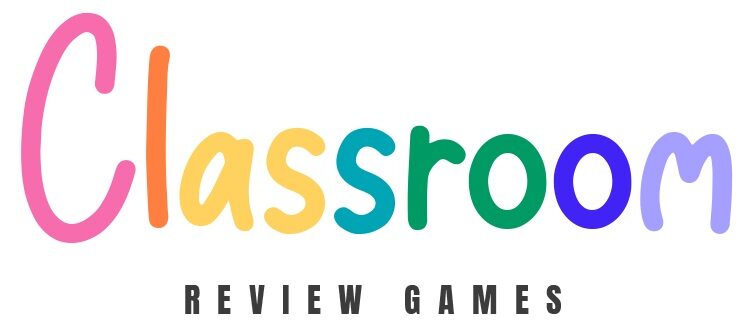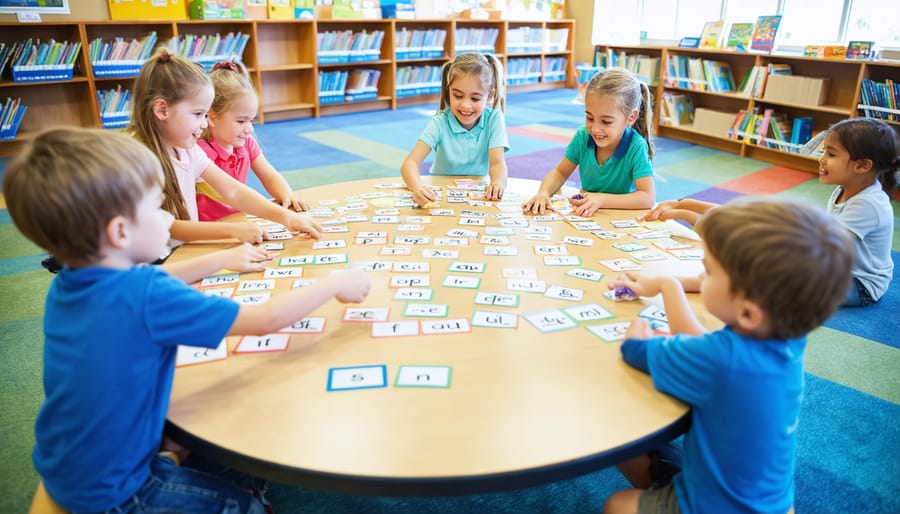Make Nouns Jump Off the Screen: Interactive Games That Transform Vocabulary Lessons
Transform your noun lessons into dynamic learning adventures with interactive vocabulary review games that captivate students and boost engagement. Whether teaching parts of speech to elementary learners or reinforcing advanced grammar concepts, interactive noun games create memorable learning experiences that stick.
Picture your students eagerly participating in “Noun Safari,” where they hunt for person, place, thing, or animal cards hidden around the classroom, or competing in “Category Champions,” where teams race to sort nouns into proper categories on digital flashcards. These hands-on activities not only reinforce essential language skills but also foster collaboration and critical thinking.
Best of all, these games adapt seamlessly to different grade levels and learning styles. From quick five-minute warmups to comprehensive review sessions, interactive noun games offer the perfect blend of education and entertainment that today’s students crave.
Why Interactive Noun Games Work in the Classroom
The Power of Active Learning
When students actively engage with learning materials, their brains create stronger neural connections, leading to better understanding and longer retention. Interactive noun games transform passive vocabulary learning into an exciting, hands-on experience that keeps students alert and motivated. Instead of simply memorizing definitions, students learn by doing – physically moving, making choices, and receiving immediate feedback.
These games also tap into multiple learning styles simultaneously. Visual learners benefit from colorful cards and displays, kinesthetic learners enjoy the physical movements involved, and auditory learners thrive on the verbal interactions. Plus, the competitive element naturally increases dopamine levels, making the learning experience more enjoyable and memorable.
Research shows that students retain up to 90% of what they learn through interactive activities, compared to just 10% through traditional reading. By incorporating these engaging noun games into your lessons, you’re not just making learning fun – you’re making it stick.

Building Confidence Through Play
Games have a remarkable way of transforming anxious students into confident participants. When students engage with noun games, they’re less focused on the fear of making mistakes and more excited about playing and winning. The competitive yet supportive nature of these activities creates a safe space where everyone feels comfortable contributing.
Think of it as learning in stealth mode – students are so caught up in the fun that they forget they’re actually studying grammar! This natural engagement helps build their confidence gradually, and before you know it, even your quietest students are eagerly raising their hands to participate.
Group games are particularly effective, as they allow students to learn from peers and share the spotlight. When everyone’s playing together, the pressure of individual performance diminishes, and learning becomes a shared adventure. Plus, the immediate positive feedback and small victories in these games create a cycle of success that carries over into other learning activities.

Popular Interactive Noun Game Templates
Noun Categories Challenge
Energize your noun lessons with this dynamic category challenge that turns grammar into an exciting team-based learning activities! Divide your class into small groups and give each team a set of noun cards or a digital word bank. Create category stations around the classroom labeled with different noun types (common, proper, abstract, collective, etc.).
When you say “Go,” teams work together to sort their nouns into the correct categories. Add excitement by setting a timer for 3-5 minutes! Teams earn points for each correctly categorized noun, with bonus points available for identifying nouns that could fit multiple categories.
Make it extra engaging by allowing teams to challenge other teams’ categorizations. This encourages deeper discussions about why certain nouns belong in specific categories. You can easily customize the difficulty by adjusting the noun selection and categories based on your students’ grade level and learning objectives.
Pro tip: Create a simple scoreboard to track progress and maintain excitement throughout the game. Consider having winning teams become “Noun Masters” who can help teach other students in future lessons!
Noun Detective
Transform your classroom into a detective agency with this engaging mystery-solving activity! Students become noun detectives, investigating sentences and stories to identify and classify different types of nouns. Create case files with “suspect sentences” where nouns are highlighted or underlined, and students must determine whether they’re common nouns, proper nouns, collective nouns, or abstract nouns.
Add excitement by giving students detective badges and magnifying glasses to “investigate” the text. Create evidence boards where students pin their noun discoveries and explain their reasoning. For advanced sleuths, include “red herrings” (words that might look like nouns but aren’t) to challenge their detective skills.
Make it competitive by dividing the class into detective teams, each racing to solve noun-related mysteries. Award points for correctly identified nouns and bonus points for explaining why each word is a noun. This game works brilliantly for both individual practice and group activities, making noun identification an adventure rather than a chore.
Rapid-Fire Noun Quiz
Get your students’ hearts racing with this high-energy noun identification game! Project a series of images or words on your screen, and give students just 5 seconds to identify whether each one is a person, place, thing, or idea. Students can respond using colored cards, mini whiteboards, or digital tools like Kahoot or Plickers.
The built-in scoreboard adds a competitive edge while tracking individual or team progress. Award one point for each correct answer and bonus points for speed. To keep things exciting, throw in “lightning rounds” where answers must be given in just 3 seconds!
Customize the difficulty by mixing common nouns with abstract ones, or focus on specific categories like occupations or landmarks. For younger learners, stick to concrete nouns with clear visual representations. For older students, challenge them with more abstract concepts and compound nouns.
Remember to celebrate both accuracy and improvement to keep motivation high!
Customization Tips for Maximum Impact
Grade-Level Adaptations
These noun games can be easily modified to suit different grade levels and learning abilities. For younger students (K-2), focus on basic noun identification using pictures and simple categories like animals, food, or toys. Keep the rules straightforward and incorporate more physical movement, like having students hop when they spot a noun.
For intermediate grades (3-5), increase complexity by including proper nouns, collective nouns, and abstract nouns. Add writing elements and challenge students to create sentences using the nouns they identify. Time limits and point systems can make games more competitive.
Advanced learners (6+) can work with compound nouns, gerunds, and more sophisticated vocabulary. Incorporate grammar relationships, such as noun-verb agreement or possessive forms. Create team challenges where students must explain why certain words are nouns or develop creative stories using specific types of nouns.
For mixed-ability classes, use partner systems where stronger students can support others. Provide visual aids and word banks for students who need extra support, while offering bonus challenges for those who finish quickly. Remember to celebrate effort and progress at all levels!
Theme Integration
Make your noun games more meaningful by connecting them to what you’re already teaching! If you’re covering a science unit about animals, create noun-spotting activities using wildlife vocabulary. During a history lesson about ancient civilizations, turn common and proper nouns into an archaeological dig activity where students uncover historical terms.
Seasonal themes work brilliantly too. In autumn, have students collect fall-themed nouns like “acorn,” “sweater,” and “harvest” for sorting games. During holiday periods, create festive noun hunts with themed vocabulary. Even your classroom reading materials can inspire themed noun activities – pull character names and setting descriptions from your current chapter book for ready-made practice materials.
Math units? Transform number word problems into noun identification challenges. Art projects? Have students list nouns related to colors, shapes, and art supplies before starting their creative work. The key is to blend noun practice naturally into your existing lessons, making vocabulary learning feel less like an isolated exercise and more like an integrated part of daily learning.

Implementation Strategies
Timing and Pacing
When it comes to playing noun games in the classroom, timing is everything! For most interactive activities, aim for 15-20 minutes per game session to maintain student engagement without causing fatigue. This sweet spot helps you make review sessions engaging while keeping your students focused and energized.
Try incorporating noun games 2-3 times per week, spacing them out to reinforce learning without overwhelming your students. For younger learners, you might want to keep sessions shorter (10-15 minutes) and more frequent. Older students can handle longer sessions, especially with team-based activities.
Pay attention to your classroom’s energy levels – morning sessions often work best for vocabulary games that require more concentration, while afternoon classes might benefit from more active, movement-based noun activities to boost engagement.
Remember to be flexible! If you notice students are particularly engaged, it’s okay to extend the game time slightly. Conversely, if attention starts to waver, wrap up early and switch to a different activity. The key is reading your classroom’s rhythm and adjusting accordingly.
Assessment Integration
Interactive noun games offer excellent opportunities for informal assessment while keeping students engaged. As students play, you can observe their understanding and track progress without the pressure of traditional testing. Keep a simple checklist nearby to note which students consistently identify nouns correctly and who might need additional support.
Many digital noun games include built-in scoring systems that can help you monitor class performance. Use these scores as quick comprehension checks, but remember to celebrate improvement rather than focusing solely on high scores. For group games, listen to student discussions and explanations – they often reveal deeper understanding or misconceptions.
Create quick exit tickets based on game results, asking students to reflect on what they learned. For instance, after playing a noun sorting game, have students write three new nouns they discovered. This provides valuable feedback while reinforcing learning. Consider keeping a “noun journal” where students can record their game achievements and new vocabulary, creating a lasting record of their progress.
Remember that assessment should feel natural and fun – if students are enjoying themselves while playing, they’re more likely to demonstrate their true understanding.
Interactive noun games offer a dynamic way to transform traditional vocabulary lessons into engaging learning experiences. By incorporating these games into your lesson plans, you’ll create an environment where students actively participate and retain information more effectively. Whether you choose digital platforms, hands-on activities, or group competitions, the key is to maintain variety and adjust difficulty levels to match your students’ needs. Remember that even simple games can yield remarkable results when implemented consistently and enthusiastically. Start small, perhaps with one game per week, and gradually expand your repertoire based on what resonates best with your class. Your students’ improved engagement and understanding of nouns will make the extra preparation time worthwhile.

